Nsg 5003 w Study guides, Class notes & Summaries
Looking for the best study guides, study notes and summaries about Nsg 5003 w? On this page you'll find 16 study documents about Nsg 5003 w.
Page 2 out of 16 results
Sort by
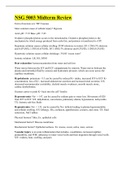
-
NURSING 5003 Midterm latest Review to booste your grades
- Other • 12 pages • 2021
-
- $14.99
- + learn more
NSG 5003 Midterm Review Form of necrosis a/w TB? Most common cause of cellular injury? Acid- pH <7.35 Base- pH >7.45 Oxidative phosphorylation occurs in the mitochondria. Oxidative phosphorylation is the mechanism by which energy produced from carbs fats, and proteins is transferred to ATP. Hypotonic solution causes cellular swelling- D5W (dextrose in water), D5 1/2NS (5% dextrose and 0.45%NS), 1/2NS (0.45%NS), D5 1/4NS( 5% dextrose and 0.2%NS), 1/4NS (0.2%NS) Hypertonic solution cau...
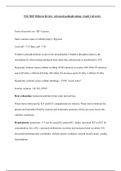
-
NSG 5003 Midterm Review: Advanced pathophysiology: South University (2020)
- Exam (elaborations) • 20 pages • 2020
- Available in package deal
-
- $15.49
- + learn more
NSG 5003 Midterm Review: Advanced pathophysiology: South University Form of necrosis a/w TB? Caseous Most common cause of cellular injury? Hypoxia Acid- pH <7.35 Base- pH >7.45 Oxidative phosphorylation occurs in the mitochondria. Oxidative phosphorylation is the mechanism by which energy produced from carbs fats, and proteins is transferred to ATP. Hypotonic solution causes cellular swelling- D5W (dextrose in water), D51/2NS (5% dextrose and 0.45%NS), 1/2NS (0.45%NS), D51/4NS( 5% dextro...
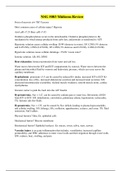
-
NSG 5003 MIDTERM REVIEW
- Exam (elaborations) • 11 pages • 2021
-
- $15.49
- + learn more
NSG 5003 Midterm Review Form of necrosis a/w TB? Caseous Most common cause of cellular injury? Hypoxia Acid- pH <7.35 Base- pH >7.45 Oxidative phosphorylation occurs in the mitochondria. Oxidative phosphorylation is the mechanism by which energy produced from carbs fats, and proteins is transferred to ATP. Hypotonic solution causes cellular swelling- D5W (dextrose in water), D5 1/2NS (5% dextrose and 0.45%NS), 1/2NS (0.45%NS), D5 1/4NS( 5% dextrose and 0.2%NS), 1/4NS (0.2%NS) Hypert...
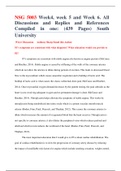
-
NSG 5003 Week4, week 5 and Week 6. All Discussions and Replies and References Compiled in one: (439 Pages) South University
- Study guide • 439 pages • 2020
-
- $12.99
- + learn more
NSG 5003 Week4, week 5 and Week 6. All Discussions and Replies and References Compiled in one: (439 Pages) South University W4A1 Discussion Anthony Sharp Email this Author PJ’s symptoms are consistent with what diagnosis? What education would you provide to PJ? PJ‘s symptoms are consistent with stable angina also known as angina pectoris (McCance and Huether, 2014). Stable angina is caused by stiffening of the walls of the coronary arteries which do not allow the arteries to dilate during...

-
NSG 5003 WEEK 1 QUIZ / NSG5003 WEEK 1 QUIZ (LATEST, 2020): SOUTH UNIVERSITY (GRADED A)
- Exam (elaborations) • 4 pages • 2020
- Available in package deal
-
- $5.49
- + learn more
NSG 5003 WEEK 1 QUIZ / NSG5003 WEEK 1 QUIZ (LATEST, 2020): SOUTH UNIVERSITY (GRADED A) 1. What is the effect of increased secretions of epinephrine, glucagon, and growth hormone? 2. What affect do androgens have on lymphocytes? 3. Exhaustion occurs if stress continues when which stage of the general adaption system is not successful? 4. What are the signs that a patient is in the adaptive stage of the general adaption syndrome? 5. The most influential factor in whether...
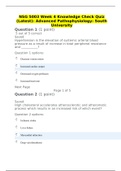
-
South University, Savannah > NSG 5003 - Week 4 Knowledge check pathophysiology - 2019/20 All Attempted Answers Correct.
- Exam (elaborations) • 3 pages • 2019
- Available in package deal
-
- $8.49
- + learn more
Hypertension is the elevation of systemic arterial blood pressure as a result of increase in total peripheral resistance and ___________? Question 1 options: Decrease venous return Increased cardiac output Decreased oxygen perfusion Increased heart rate Question 2 (1 point) High cholesterol accelerates atherosclerotic and atheromatic process which results in an increased risk of which event? Question 2 options: Ischemic stroke Liver failure Myocardial infarction Deep vein throm...

Do you wonder why so many students wear nice clothes, have money to spare and enjoy tons of free time? Well, they sell on Stuvia! Imagine your study notes being downloaded a dozen times for $15 each. Every. Single. Day. Discover all about earning on Stuvia


